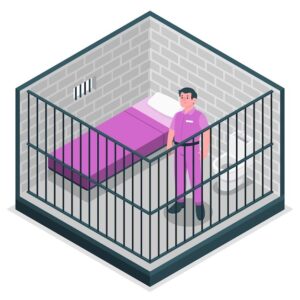Overview:
At the core of Nigeria’s justice system lies an institution dedicated not only to punishment, but also to redemption and rehabilitation. The Nigeria Correctional Services (NCoS) has undergone a remarkable evolution, reflecting the nation’s commitment to fostering positive change within its incarcerated population. Let’s embark on a journey through the history, mission, infrastructure, inmate population, programs, staffing, challenges, success stories, community engagement, and outlook of the NCoS.
The Nigerian Correctional Services (NCoS) is the government agency responsible for the management and administration of correctional facilities in Nigeria. Its primary mission is to secure the custody of offenders while also ensuring their reformation, rehabilitation, and successful reintegration into society. The approach has shifted from a punitive stance to one of empowerment through rehabilitation programs focused on education, vocational training, and skill acquisition. These initiatives are designed to equip inmates for a successful reintegration into society upon release.
The NCoS oversees a range of correctional facilities, including custodial and correctional centres nationwide. These facilities serve individuals awaiting trial and those serving sentences. In addition to incarceration, the Nigerian Correctional Services prioritises administering non-custodial measures, including community service, probation, parole, restorative justice measures and any other non-custodial measure assigned by a court of competent jurisdiction, as part of its commitment to a more rehabilitative approach. The Service places significant emphasis on training its personnel to ensure they are equipped to handle the diverse challenges in corrections and rehabilitation.
With a dedicated workforce of trained professionals, including custodial officers, non-custodial officers, and administrative staff, the NCoS plays a crucial role in the operation and management of correctional facilities. Collaborating with various stakeholders, including other government agencies, non-governmental organizations, and international partners, the NCoS aims to enhance its capacity and improve inmate welfare.
Efforts are underway to modernize the correctional system by integrating technology for record-keeping, inmate management, and overall efficiency. Moreover, there is a concerted effort to increase public awareness about the goals and activities of the NCoS, fostering understanding and support for its mission within the community.
History and Background:

The Nigeria Correctional Services is fundamentally dedicated to promoting public safety through secure, humane, and efficient correctional services. Its core objectives revolve around rehabilitation, reformation, and crime prevention, with a focus on equipping inmates with the necessary skills and support for successful reintegration into society upon release.
Established in 1861 during the British colonial rule, the Nigeria Correctional Services has undergone significant transformations. Initially known as the Nigerian Prisons Service, it primarily emphasized punitive measures such as confinement and deterrence. However, recognizing the imperative for reform, Nigeria embarked on a series of initiatives aimed at shifting the focus towards rehabilitation and reintegration.
The modern Correctional Service in Nigeria traces its roots back to 1861, coinciding with the establishment of Western-style prisons in the region. This milestone was catalysed by the formalization of governance mechanisms following the declaration of Lagos as a colony. Initially, the colonial administration prioritised safeguarding trade interests, ensuring merchant profits, and supporting missionary activities.
To fulfil these objectives, the acting governor of the Lagos colony, a prominent British merchant, established a Police Force comprising around 25 constables in 1861. Subsequently, in 1863, four courts were instituted in Lagos to address various legal matters, highlighting the necessity for prison facilities within the colonial framework. Consequently, in 1872, the Broad Street prison was established, initially accommodating up to 300 inmates.
In the Niger Delta, the regulation of interactions between local communities and British merchants was facilitated by special merchant courts supported by the British Navy, especially following the appointment of John Beecroft as consul in 1849. Although indications of prison facilities in Bonny existed during this period, details regarding their scale and composition are limited. However, individuals opposing British rule, such as Jaja of Opobo and King Dappa of Bonny, were often deported.
The progressive expansion of British influence into the hinterlands and the establishment of British protectorates towards the late 19th century necessitated the establishment of prisons as an integral component of the Criminal Justice System. By 1910, prisons were operational in various locations across Nigeria, reflecting the consolidation of British authority.
During the colonial era, prisons primarily served punitive functions rather than focusing on inmate rehabilitation. There was a lack of systematic penal policies guiding penal administration, with prisoners primarily employed for public works and administrative tasks. Consequently, there was minimal emphasis on recruiting and training prison officers, leading to a reliance on ex-servicemen for such roles.
The Prison Regulation published in 1917 outlined admission, custody, treatment, and classification procedures, as well as staffing, dietary, and clothing standards. However, these regulations primarily aimed at containment rather than rehabilitation and predominantly applied to individuals convicted or remanded by British-inspired criminal courts, with those sentenced by Native courts directed to Native Authority prisons.
Significant efforts to modernise the Prison Service began in 1934 when Colonel V. L. Mabb, the appointed Director of Prisons, sought to establish a unified prison structure nationwide. Although not entirely successful, he expanded the Director of Prisons’ supervisory powers over the Native Authority Prisons and established the Prisons Warders Welfare Board. These efforts were continued by his successor, R. H. Dolan (1946–1955), who introduced vocational training, mandatory prisoner classification, family visitation, and progressive earning schemes for offenders. Additionally, Dolan focused on infrastructure development, manpower training, and the establishment of reformatories and open prisons, representing significant strides in the evolution of the Nigeria Prisons Service.
Structure:

At the apex of the Nigerian Correctional Services hierarchy stands the Controller-General, who reports directly to the President through the Minister of Interior and the Civil Defence, Fire, Immigration, and Corrections Board chaired by the Minister.
Assisting the Controller -General are Deputy Controller-Generals (DCGs), each overseeing one of the eight administrative divisions known as Directorates. These Directorates play a pivotal role in efficient management and cover specific areas of prison administration. Together, the DCGs, along with the Controller-General, constitute the highest decision-making body within the Nigerian Correctional Service.
The Directorates include:
- Finance and Account
- Inmates Training and Productivity
- Human Resources
- Works and Logistics
- Health and Welfare
- Training and Staff Development
- Operations
- Non-Custodial Services
These Directorates collectively ensure comprehensive coverage of crucial aspects of correctional facility management, enabling the Nigeria Correctional Services to effectively pursue its mission and objectives.
Mission and Objectives:

The Nigeria Correctional Services is guided by a clear mission to contribute to public safety through the provision of secure, humane, and efficient correctional services. Its overarching objectives revolve around rehabilitation, reformation, and crime prevention, aiming to equip inmates with the skills and support necessary for successful reintegration into society upon release.
Infrastructure and Facilities:
The correctional system encompasses a diverse range of facilities, including custodial centres, correctional centres, and rehabilitation institutions. Despite ongoing efforts to enhance conditions and modernize facilities, challenges such as overcrowding remain prevalent. However, continuous initiatives are underway to address these challenges, with focus on improving infrastructure and ensuring dignified living conditions for inmates.
In addition to its commitment to justice and rehabilitation, the Nigeria Correctional Services operates a network of correctional centres across the country. According to the World Prison Brief (WFB), there are two hundred and forty (240) correctional centres strategically located throughout Nigeria as of 2021. These centres serve as vital hubs for implementing rehabilitation programs, providing educational opportunities, and facilitating the reintegration of inmates into society. By leveraging this extensive network, the NCoS endeavours to make a meaningful impact on the lives of individuals within the correctional system and contribute to a safer and more just society.
Inmate Population:

The inmate population within the Nigerian Correctional Services reflects the diversity of Nigerian society, encompassing individuals of various genders, ages, ethnicities, and backgrounds. Despite efforts to improve conditions, challenges such as overcrowding persist, impacting inmate welfare and rehabilitation endeavours. Nevertheless, the NCoS remains steadfast in its commitment to address these issues through holistic approaches to offender management.
According to data from the Official Website of the Nigerian Correctional services, as of February 12th, 2024, the inmate population was as follows:
| Description | Quantity |
| Total Inmate Population | 77,552 |
| Total Male Inmates | 75,809 |
| Total Female Inmates | 1,743 |
| Total Convicted Inmates | 23,643 |
| Convicted Male Inmates | 23,216 |
| Convicted Female Inmates | 427 |
| Total Awaiting Trial Inmates | 53,909 |
| Awaiting Trial Male Inmates | 52,593 |
| Awaiting Trial Female Inmates | 1,316 |
| Percentage Distribution: | |
| Convicted Inmates | 30% |
| Awaiting Trial Inmates | 70% |
| Gender Distribution: | |
| Male Inmates | 98% |
| Female Inmates | 2% |
Correctional Programs:

Within the correctional system, a variety of rehabilitation and reintegration programs are offered, including education, vocational training, counselling, and substance abuse treatment. These programs empower inmates to acquire skills and knowledge for successful reintegration into society, thereby reducing recidivism and fostering long-term positive outcomes.
The Inmates’ Training and Productivity (ITP) Directorate, as per The Nigerian Correctional Services, is tasked with training inmates, particularly in Correctional Farms and Industries, to equip them with self-sustaining skills and foster a positive attitude towards labour.
This Directorate oversees Correctional workshops and cottage industries, providing training in fields such as furniture making, soap making, aluminium pot manufacturing, and metal works fabrication. These programs aim to impart practical skills to inmates, enabling them to lead self-sufficient lives upon release.
Additionally, the Agricultural Section of this Directorate manages Correctional Farm Centres, subsidiary farms, and market gardens, with the primary goal of training inmates in farming methods, animal husbandry, and agricultural techniques, to prepare them for employment in these sectors post- release. While focusing on training, the Mechanized Farm component also aims to generate revenue and contribute positively to the national food supply by providing affordable food products.
Key functions include:
- Conducting training programs for inmates in custodial farms and industries.
- Oversight of Correctional workshops and industries nationwide.
- Management of Correctional Farms, subsidiary farms, and market gardens, including piggeries and fisheries, among others.
Staffing and Training:

The recruitment, training, and ongoing professional development of correctional staff are essential pillars in achieving the goals of the NCoS. Skilled and compassionate personnel play a pivotal role in providing effective rehabilitation and support services to inmates, fostering a culture of dignity, respect, and accountability within correctional facilities.
As the overseer of all training initiatives within the Nigerian Correctional Service, the Training and Staff Development Directorate holds several key responsibilities aimed at enhancing the capabilities of the staff. These responsibilities include:
- Orchestrating the formulation, planning, execution, and assessment of policies governing staff training and development.
- Coordinating collaboration between the Service and various stakeholders, including the public and non-state actors.
- Assessing and proposing capacity-building programs tailored to the specific needs of the Service to ensure staff are equipped with the requisite skills and knowledge.
- Maintaining a comprehensive repository of all training and staff development endeavours under their supervision.
- Streamlining the educational agenda for staff to ensure an alignment with organizational objectives and individual career growth.
- Overseeing and executing the formulation, planning, and implementation of educational policies within the Nigerian Correctional Service.
- Identifying and nominating eligible personnel for participation in United Nations Peacekeeping Operations, recognizing the value of international collaboration and experience.
Challenges:

The Nigerian Correctional Services grapple with multifaceted challenges that significantly impact their effectiveness in fulfilling their mission. Foremost among these challenges is overcrowding, where prisons often accommodate more inmates than their designed capacity. This leads to deplorable living conditions, compromised hygiene, and increased tension among inmates. Inadequate facilities compound the problem, as many prisons lack the necessary infrastructure to support rehabilitation efforts. Poorly maintained buildings, insufficient medical facilities, and inadequate security measures contribute to the overall challenges faced by the correctional system.
Financial constraints also pose a significant hurdle. The Correctional Services often operate with limited budgets, hindering their ability to invest in necessary improvements and initiatives. This affects everything from staff training to infrastructure development and hampers efforts to address the root causes of criminal behaviour. Legal delays exacerbate issues in the correctional system, leading to overcrowding and a backlog of cases. Pre-trial detentions and slow court proceedings deny individuals their right to a speedy trial.
Furthermore, the lack of effective rehabilitation programs is a critical concern. Successful reintegration into society requires comprehensive initiatives to address the root causes of criminal behaviour and equip inmates with the skills needed for lawful living upon release. Unfortunately, the current system often falls short in providing these essential programs.
In summary, the Nigerian Correctional Services face a myriad of challenges, including overcrowding, inadequate facilities, financial constraints, delays in legal processes, and the need for more robust rehabilitation programs. Addressing these issues is crucial for the correctional system to fulfil its role in promoting justice, rehabilitation, and societal well-being.
Reforms:

The Nigerian Correctional Service, celebrated the Nigerian Correctional Service Act 2019 as a significant reform during former President Buhari’s administration, prioritizing the well-being of inmates both mentally and physically. Haliru Nababa, the Controller General of the Nigerian Correctional Service, conveyed this sentiment during the ‘Prison Reforms and National Security’ webinar organized by the Nigerian Economic Summit Group. DCG Sylvester Nwakuche, representing the CG, emphasized the Act’s importance, highlighting its focus on transitioning from prisons to correctional services and the distinction between custodial and non-custodial services.
Key provisions of the Act were underscored, including the establishment of a Controller General of Corrections and criteria for their appointment. The Act also delineates responsibilities such as custody of legally interned individuals, transportation of remanded persons, and implementation of rehabilitation and reintegration programs. Addressing concerns like overcrowding, the Act mandates prompt intervention when custodial centres exceed capacity.
Regarding inmates on death row, the Act aims to alleviate mental anguish by offering hope through provisions for re-evaluation after ten years. Additionally, it addresses stigmatization by issuing certificates to proficient offenders to facilitate societal reintegration. Ensuring inmates’ nutritional needs, particularly for female prisoners, is also a priority, with funding reviews every five years aligned with economic trends.
Efforts towards inmate reformation include educational programs, with thousands enrolled in adult education and hundreds graduating. Notably, an increasing number pursue higher education, with some even studying law or pursuing postgraduate degrees. Despite progress, challenges such as insufficient vehicles and infrastructure persist, although the government has approved prison facility rehabilitation.
Looking ahead, the DCG advocated for strengthening the domestication of the Criminal Justice Act at the state level to expedite trials and enhance inmate treatment and rehabilitation through vocational and educational initiatives. Highlighting a concerning statistic, he noted that over 70% of the prison population are awaiting trial, reflecting systemic issues in the justice system.
According to the report, Ms. Aladesanmi Joke, the Executive Director of the Centre for Legal Support and Inmate Rehabilitation, acknowledged the Act’s comprehensive scope but questioned its effectiveness in implementation. She highlighted a high likelihood of inmates returning to prison post-trial, indicating the need for further scrutiny and improvement in the criminal justice system’s functionality.
Success Stories:

Despite the challenges, numerous success stories illuminate the transformative power of rehabilitation and reintegration. Individuals who have successfully transitioned back into society after serving their sentences serve as beacons of hope, demonstrating the potential for positive change within the correctional system.
According to Officer AD Umar, the National PRO of the NCoS, lots of success stories abound for them in the Nigerian Correctional Service. They have been able to secure custodial facilities, and have enhanced inmates’ reformation, rehabilitation, and reintegration. Additionally, the integration of technology into operations, especially in surveillance and rapid response, has been successful. Many inmates are emerging as better citizens upon their return to the larger community.
Educational programs within the correctional system are thriving. The use of education and vocational training has empowered inmates especially with the present robust partnership established with the National Open University of Nigeria (NOUN). As a result, inmates are acquiring certificates and degrees while serving their terms, with six (6) inmates currently pursuing Ph.D. programs in custody.
Another notable success story is the signing into law of the Nigerian Correctional Service Act 2019, which brought tremendous reforms in the Service. The Act expanded the management of the Service, and introduced non-custodial measures, aligning with modern practices in corrections.
Community Engagement:

The community plays a vital role in supporting the reintegration of former inmates. Initiatives aimed at reducing stigma and promoting acceptance provide ex-offenders with opportunities for a fresh start, fostering a supportive environment conducive to successful reintegration and societal inclusion.
Officer AD Umar also said that the Service does not exist in isolation; it is an integral part of the community. Therefore, the dynamics of the community significantly impact their operations, and vice versa. Recognising this, the service acknowledges that community members and leaders are major stakeholders in achieving their mandates.
The Nigerian Correctional Service Act 2019 introduced non-custodial measures which are also known as community corrections. Consequently, the service has been empowered to supervise offenders serving non-custodial sentences such as community service, parole, and suspended sentences. In fact, community leadership plays a pivotal role in the supervision of offenders. By involving the community in the supervisory process, they become active participants in the reform and reintegration of offenders serving their sentences within the community.
Outlook:

Looking ahead, the future of the Nigeria Correctional Services is one of continued innovation and progress. Strategic plans, policy initiatives, and technological innovations aim to further enhance outcomes for inmates and society, reaffirming Nigeria’s commitment to justice, rehabilitation, and human dignity.
According to the NCoS National PRO, there are huge prospects for the Service in the near future. The Service aspires to become a global leader, particularly in the safe and humane custody of offenders, as well as their transformation into better citizens upon discharge. Additionally, the NCoS aims to entrench non-custodial services to complement custodial measures in the future.
In conclusion, the Nigeria Correctional Services stands as a beacon of hope and transformation, embodying Nigeria’s commitment to justice, rehabilitation, and societal reintegration. Through concerted efforts and community engagement, the NCoS continues to pave the way for positive change, transforming lives and building a brighter future for all.
A holistic solution to the challenges facing the NCoS involves infrastructure development, staff training, rehabilitation programs, judicial collaboration, technological advancements, and community engagement. This comprehensive strategy aims not only to improve the conditions within correctional facilities but also to foster a more rehabilitative and integrative approach to criminal justice.
Researched By Victoria Osuagwu Esq
March 2024







